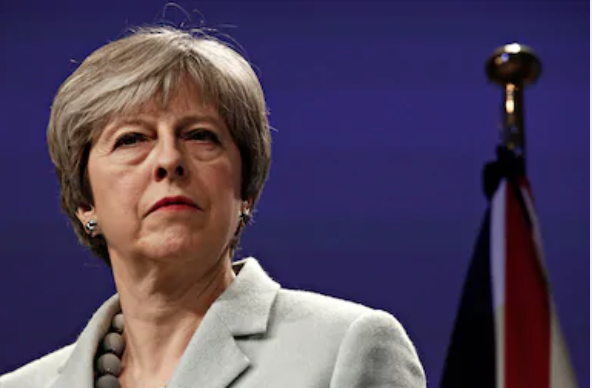Crucial decisions made over Brexit

Alexandros Michalidis (Shutterstock)
British Prime Minister Theresa May suffered a defeat with the failure of Brexit, yet is still persistent after narrowly surviving her no-confidence vote. May is closed to talks of taking the deal off the table, and inter-party discussions regarding Britain’s future are slated to be held beginning next week.
January 17, 2019
In a vote on Jan. 29, members of the British Parliament were allowed to vote on seven amendments to Prime Minister Theresa May’s Brexit Plan, while suggesting their own amendments. This vote came following the rejection of May’s original Brexit deal, as well as her surviving a no-confidence vote.
While five of the proposed amendments failed, two passed. The first requires a renegotiation of the border between Ireland and North Ireland, the sole location where there is a border present between UK and the EU. Earlier, May proposed to not have a “hard border,” allowing goods to traverse the border without regular checks. The MPs of May’s Conservative Party do not support a weak break, leading to their dissatisfaction and ultimate push for a full break from the rest of the EU.
The second amendment pushes for a deal to be made with the rest of the European Union prior to the UK leaving. However, this has bred conflict as the EU refuses to strike a new deal.
Currently, the UK is poised to leave the EU on March 29. Should no deal be struck by then, the UK would be forced to leave without any talks or smooth transition.
This story was updated on January 30.
British Prime Minister Theresa May’s Brexit plan was defeated in a vote of 432-202 on Tuesday, a crushing and historic defeat. Britain was originally set to exit the European Union in 72 days, the future of which is now unclear.
In a letter to May, the Presidents of the EU, Donald Tusk and Jean-Claude Juncker, insisted that they had reached their final Brexit deal, with no possibility of a renegotiation. Following the Tuesday vote was a no-confidence vote schedule by Opposition Leader Jeremy Corbyn for Wednesday which May narrowly survived in a vote 325-306. Later that afternoon, May made a statement that she would continue to push for a re-do of her Brexit plan, prompting Corbyn to declare his boycott of talks until Brexit is on the table.
British markets have felt the implications of the Brexit vote as well, with the FTSE (Financial Times Stock Exchange) was recorded at 29 points lower, and the DAX (Data Analytics Expressions Index) down 42 points.


















![“[Building nerf blasters] became this outlet of creativity for me that hasn't been matched by anything else. The process [of] making a build complete to your desire is such a painstakingly difficult process, but I've had to learn from [the skills needed from] soldering to proper painting. There's so many different options for everything, if you think about it, it exists. The best part is [that] if it doesn't exist, you can build it yourself," Ishaan Parate said.](https://harkeraquila.com/wp-content/uploads/2022/08/DSC_8149-900x604.jpg)




![“When I came into high school, I was ready to be a follower. But DECA was a game changer for me. It helped me overcome my fear of public speaking, and it's played such a major role in who I've become today. To be able to successfully lead a chapter of 150 students, an officer team and be one of the upperclassmen I once really admired is something I'm [really] proud of,” Anvitha Tummala ('21) said.](https://harkeraquila.com/wp-content/uploads/2021/07/Screen-Shot-2021-07-25-at-9.50.05-AM-900x594.png)







![“I think getting up in the morning and having a sense of purpose [is exciting]. I think without a certain amount of drive, life is kind of obsolete and mundane, and I think having that every single day is what makes each day unique and kind of makes life exciting,” Neymika Jain (12) said.](https://harkeraquila.com/wp-content/uploads/2017/06/Screen-Shot-2017-06-03-at-4.54.16-PM.png)








![“My slogan is ‘slow feet, don’t eat, and I’m hungry.’ You need to run fast to get where you are–you aren't going to get those championships if you aren't fast,” Angel Cervantes (12) said. “I want to do well in school on my tests and in track and win championships for my team. I live by that, [and] I can do that anywhere: in the classroom or on the field.”](https://harkeraquila.com/wp-content/uploads/2018/06/DSC5146-900x601.jpg)
![“[Volleyball has] taught me how to fall correctly, and another thing it taught is that you don’t have to be the best at something to be good at it. If you just hit the ball in a smart way, then it still scores points and you’re good at it. You could be a background player and still make a much bigger impact on the team than you would think,” Anya Gert (’20) said.](https://harkeraquila.com/wp-content/uploads/2020/06/AnnaGert_JinTuan_HoHPhotoEdited-600x900.jpeg)

![“I'm not nearly there yet, but [my confidence has] definitely been getting better since I was pretty shy and timid coming into Harker my freshman year. I know that there's a lot of people that are really confident in what they do, and I really admire them. Everyone's so driven and that has really pushed me to kind of try to find my own place in high school and be more confident,” Alyssa Huang (’20) said.](https://harkeraquila.com/wp-content/uploads/2020/06/AlyssaHuang_EmilyChen_HoHPhoto-900x749.jpeg)





